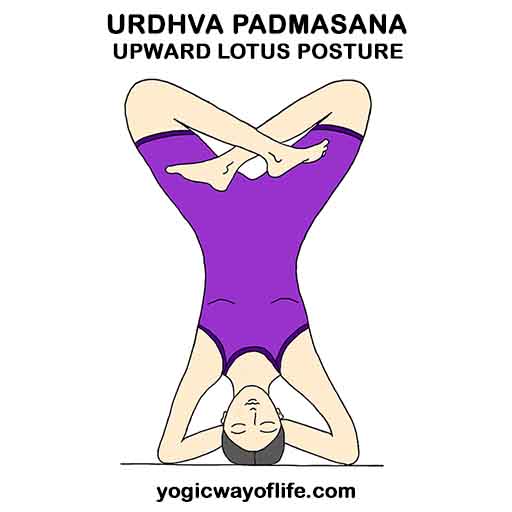Urdhva Padmasana or the lotus pose in headstand can be practiced after mastering Sirsasana or the classical headstand pose. Urdhva Padmasana is an inverted asana and is performed after assuming the classical headstand. It is one of the difficult asanas and should be learned under the guidance of a qualified yoga instructor.
Master Sirsasana before attempting Urdhva Padmasana, as any fall can cause serious injury. Avoid this asana if you suffer from high blood pressure, vertigo, heart palpitations, thrombosis or severe near sightedness.

How to perform Urdhva Padmasana (Lotus in Headstand)?
- Place a folded blanket on the floor. Perform Sirsasana, the classical headstand. In the initial stages, one may make use of the wall for support. Alternatively, a friend or colleague can watch over you to prevent any fall.
- Once you have mastered Sirsasana, Urdhva Padmasana is easy.
- Slowly bend the right leg and place it on the left thigh.
- Then take the left leg and place it on the right thigh.
- The two legs are interlocked in the lotus position.
- Remain in this position for as long as you are comfortable. Breathe normally in the final position.
- To release the pose, straighten the legs and then slowly bring down the legs to the floor, similar to the way Sirsasana is released.
- Lie down and rest in Shavasana or the Corpse pose for few minutes.
Benefits of Urdhva Padmasana (Lotus in Headstand)
- Being an inverted asana, Urdhva Padmasana gives all the benefits of the classicalinveretd asanas like Sirsasana.
- It is good for Brahmacharya or celibacy.
- There is increased flow of blood to the brain removing many nervous and glandular disorders.
- This can help to improve memory and remove tiredness during mental work.
- It is said that in ancient times, many ascetics used this asana for doing Tapas or austerity.
Contraindications for Urdhva Padmasana
- Urdhva Padmasana should not be performed by those suffering from spondylitis.
- Those with any injury to neck and soulders should avoid this pose.
- If you suffer from vertigo, do thos pose with caution with some one to help during the practice.
